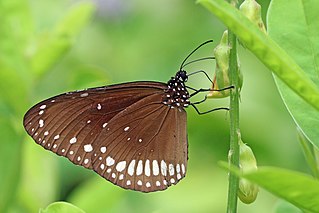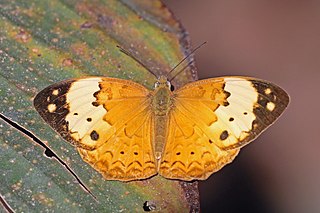
Euploea core, also known as the common crow, is a common butterfly found in South Asia to Australia. In India it is also sometimes referred to as the common Indian crow, and in Australia as the Australian crow. It belongs to the crows and tigers subfamily Danainae.

Cepora nerissa, the common gull, is a small to medium-sized butterfly of the family Pieridae, that is, the yellows and whites, which is native to Sri Lanka, India, China, southeast Asia, and Indonesia.

Papilio nephelus is a species of swallowtail butterfly belonging to the family Papilionidae. Subspecies include P. n. chaon, the yellow Helen, and P. n. sunatus, the black and white Helen.

Meandrusa payeni, the yellow gorgon, is a species of swallowtail found in parts of South Asia and Southeast Asia. It belongs to the hooked swallowtails genus, Meandrusa, of the family Papilionidae. It is also called the outlet sword or the sickle.

Papilio clytia, the common mime, is a swallowtail butterfly found in south and southeast Asia. The butterfly belongs to the subgenus Chilasa, the black-bodied swallowtails. It serves as an excellent example of a Batesian mimic among the Indian butterflies.

Papilio (Chilasa) paradoxa, the great blue mime, is a swallowtail butterfly found in India and parts of South-East Asia. The butterfly belongs to the mime subgenus, Chilasa, of the genus Papilio. It is an excellent mimic of different species of Euploea.

Zemeros flegyas, the Punchinello, is a small butterfly found in South Asia and Southeast Asia that belongs to the family Riodinidae.

Hebomoia glaucippe, the great orange-tip, is a butterfly belonging to the family Pieridae, that is the yellows and whites. It is found in the Indomalayan realm and Wallacea.

Cepora nadina, the lesser gull, is a small to medium-sized butterfly of the family Pieridae, that is, the yellows and whites. The species was first described by Hippolyte Lucas in 1852. It is native to Sri Lanka, India, Myanmar, Hainan, and southeast Asia.

Euploea mulciber, the striped blue crow, is a butterfly found in India and Southeast Asia that belongs to the crows and tigers, that is, the danaid group of the brush-footed butterflies family.

Euploea klugii, the brown king crow or king crow, is a butterfly from the family Nymphalidae found in India and Southeast Asia. The species was first described by the entomologist Frederic Moore in 1858.

Miletus symethus, the great brownie, is a small butterfly found in India that belongs to the lycaenids or blues family. The species was first described by Pieter Cramer in 1777.

Caleta elna, the elbowed Pierrot, is a small butterfly found in India and Southeast Asia that belongs to the lycaenids or blues family.

Kaniska canace, the blue admiral, is a nymphalid butterfly, the only species of the genus Kaniska. It is found in south and southeast Asia.

Cupha erymanthis, the rustic, is a species of brush-footed butterfly found in forested areas of tropical South Asia and Southeast Asia. The males and females are identical.

Dophla evelina, the red-spot duke, is a species of brush-footed butterfly found in Cambodia and South and Southeast Asia. Many subspecies are accepted. The species was first described by Caspar Stoll in 1790.

Nacaduba hermus, the pale four-line blue, is a species of lycaenid butterfly found in Indomalayan realm. The species was first described by Baron Cajetan von Felder in 1860.

Doleschallia bisaltide, the autumn leaf, is a nymphalid butterfly found in South Asia, Southeast Asia, and Australasia. In Australia it is also known as the leafwing.

The Andaman crow is a species of nymphalid butterfly in the Danainae subfamily. It is found in India and Burma.

Catopyrops ancyra, or Felder's lineblue, is a species of butterfly belonging to the lycaenid family described by Cajetan Felder in 1860. It is found in the Indomalayan and Australasian realms.




















